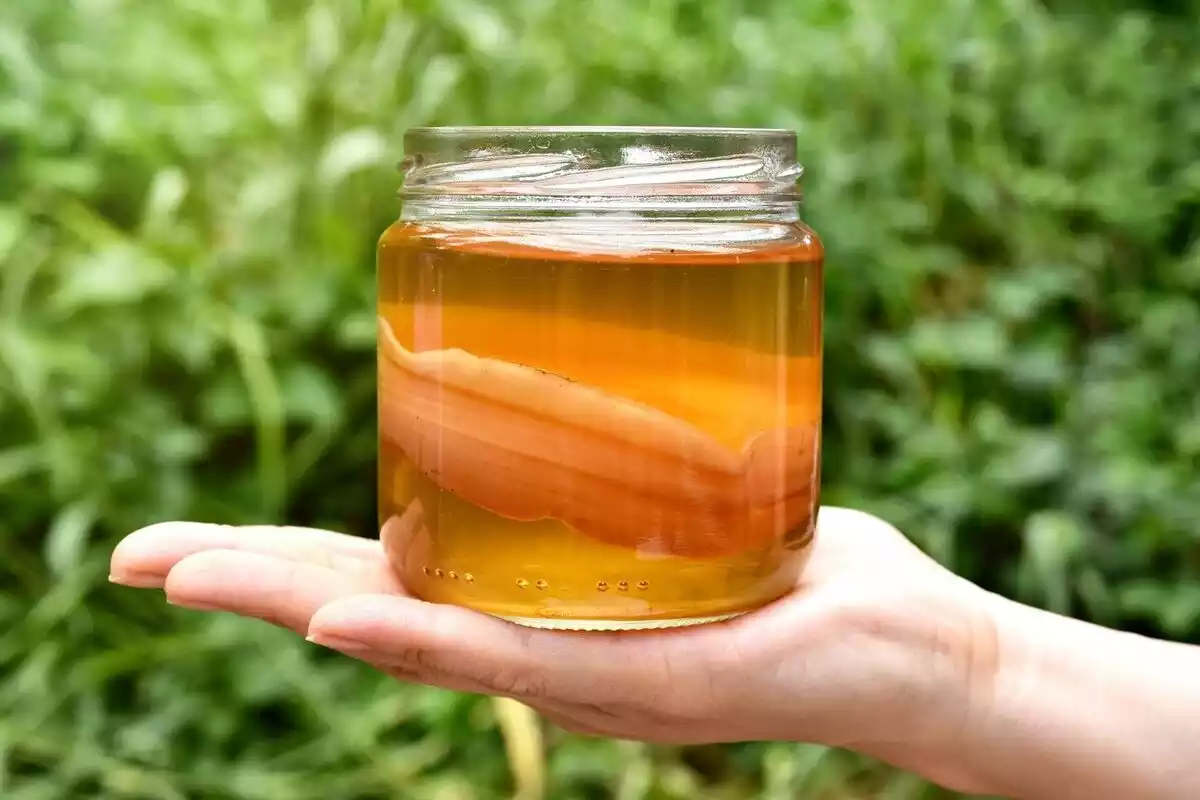The popularization of healthier and more natural ways of caring for the body has caused the reappearance of all kinds of foods and drinks used in traditional medicine from different cultures. The fermented tea beverage called kombucha is a great example of this.
In this article, we will discuss what kombucha is and its health benefits, as well as the possible risks involved if consumed in excess.
What is kombucha?
Kombucha is a drink made of lightly fermented tea and sugar. Although this drink is centuries old and traditional in specific areas of China, Eastern Russia, and Eastern Europe, currently this beverage can be bought at almost all supermarkets, and we can even make it ourselves at home.
However, although the homemade version may seem more natural, there have been several cases of food poisoning due to the improper preparation of this beverage, or contamination with pathogens. So, the safest option is buying it at a trusted supermarket.
Thanks to the numerous benefits of this beverage, it has become famous worldwide. This is due to its rich vitamin, mineral, and enzyme content that favor digestive function and even benefits the heart and brain.
To be more specific, this drink is sweetened and fermented using SCOBY. This term is an acronym used to describe a symbiotic culture of bacteria and yeast. We could say that SCOBY is a home for the good bacteria that make kombucha a drink rich in nutrients and probiotics.
The fermentation process for this beverage takes between 7 and 12 days, depending on the temperature of its environment and the SCOBY's strength. When the fermentation process is complete, the bacteria eliminates 90% of the sugar. This is what makes it a low calorie and low sugar drink.
Kombucha health benefits
Traditional medicine attributes many properties of all kinds to this fermented beverage. However, not all of these are proven. Below, we list kombucha's benefits that are proven and backed up by science.
A source of probiotics
Just like other foods that are in style now, like kefir, kombucha's fermentation produces a large number of probiotic bacteria.
Probiotics bring good bacteria to the intestines that help to improve digestion, lessen gastrointestinal inflammation, and even favors weight loss.
Provides the same benefits as green tea
Although you can make this beverage with different varieties of tea, when it is made using green tea, it retains many of the same benefits.
Green tea is characterized by the large number of bioactive agents known as polyphenols that it contains, which are known for their potent antioxidant powers.
According to studies, the green tea in this drink aids helps to burn fat and improves the ability to burn calories. Furthermore, it improves cholesterol levels and helps to control the sugar in the bloodstream.
Rich in antioxidants
This drink's antioxidant properties stand out. Antioxidants are substances that fight the free radicals found in the body - these agents are reactive molecules that can injure the body’s cells.
Although testing has not been done on humans, recent studies indicate that there is a possibility that kombucha could improve the symptoms of liver disease, thanks to its antioxidant effects on the liver.
Eliminates bacteria from the body
This beverage made using black or green teas seems to have strong antibacterial properties.
During the fermentation process, a substance called acetic acid is produced, which is also found in other components such as vinegar, and this can eliminate many potentially harmful microorganisms.
According to studies, kombucha tea is also useful in treating infections and candidiasis.
Could reduce the risk of heart disease
Animal testing reveals that kombucha could considerably improve the signs of heart disease, as well as levels of LDL and HDL cholesterol, and although this still has not been tested in humans, this is a promising research area.
Regular green tea consumption can decrease the risk of heart disease, which is why this beverage prepared with green tea can have the same benefits.
Could help to control type 2 diabetes
High blood sugar levels and insulin resistance indicate type 2 diabetes.
Some research done on animals indicates that green tea kombucha could decrease blood sugar levels and improve renal and liver function.
Could naturally protect the body from cancer
In vitro studies suggest that the high levels of polyphenols and antioxidants in kombucha could prevent the growth and dissemination of cancer cells.
Although the specific mechanisms of polyphenols as carcinogens is still unknown, some hypotheses suggest that these could block genetic mutation and cancer cell growth.

Making homemade kombucha
As we mentioned, there are certain controversies when it comes to making this fermented beverage at home. Although there are countless recipes and the ingredients are easy to find, buying this drink premade is still recommended.
If prepared incorrectly, the drink could be over fermented, which could lead to serious health problems. There have even been cases of death by food poisoning caused by homemade kombucha gone wrong.
Also, since it is fermented, kombucha is a slightly alcoholic drink - although at the store it is sold as non-alcoholic since it contains less than 0.5% alcohol. However, when homemade, this beverage could contain up to 3% alcohol.
References
Chakravorty, S., Bhattacharya, S., Chatzinotas, A., Chakraborty, W., Bhattacharya, D. & Gacchui, R. (2016). Kombucha tea fermentation: microbial and biochemical dynamics. International Journal of Food Microbiology.
Jayabalan, R. (2014). A review on kombucha tea-microbiology, composition, fermentation, beneficial effects, toxicity, and tea fungus. Comprehensive Reviews in Food Science and Food Safety.
Serafini, M., Ghiselli, A. & Ferro-Luzzi, A. (1996). In vivo antioxidant effect of green and black tea in man. European Journal of Clinical Nutrition.
